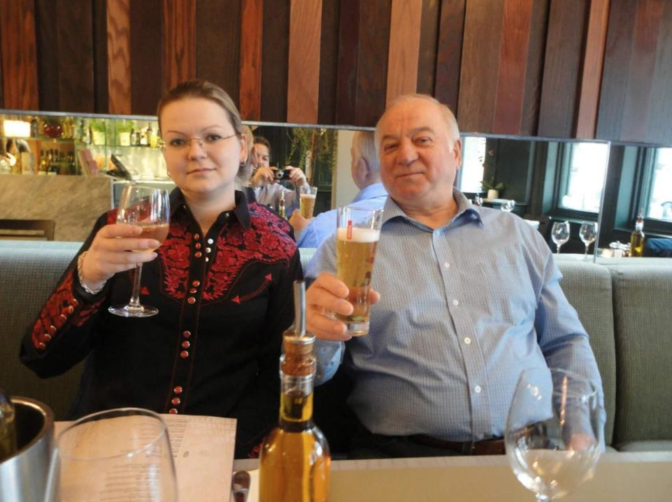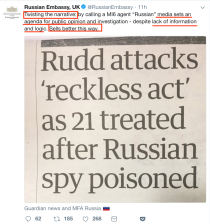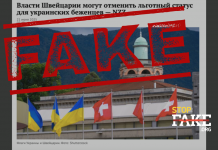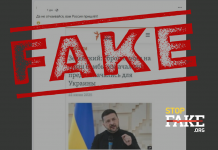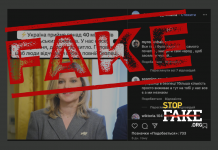By Paula Chertok. for East West blog
The Russian Embassy’s twitter account is often a display of old and new Russian propaganda. The “old” propaganda we became accustomed to touts Russia’s natural beauty, grain harvests, birthdays and anniversaries of heroes and heroic events in Russian and Soviet history. By “new” propaganda, I mean the sort of thing we’ve seen in the last few years better described as disinformation–purposely misleading and false information used to sway public opinion for a political agenda. And indeed, the West is now becoming painfully familiar with Russian disinformation campaigns, particularly after we experienced one in full force on social media during the 2016 US presidential election.
The recent poisoning of two Russians in Britain last week is a perfect window into the disinformation tactics commonly used by Russian officials to lie, obfuscate, gaslight and troll in order to deflect Kremlin responsibility. Let’s review the Russian Embassy’s tweets on the poisoning of ex-spy Sergei Skripal and his daughter with a deadly chemical weapon last Sunday afternoon in Salisbury, England.

Sergei Skripal, a 66-year-old former Russian double agent living in the UK since 2010 and his 32-year old daughter Yulia, a Russian citizen, were found slumped and unconscious on a bench after a lovely afternoon of shopping and dining in sleepy town of Salisbury. Investigators found traces of the chemical nerve agent they were attacked with at both the restaurant and the pub they visited on Sunday. Some 500 people may have been exposed to the nerve agent, including a police officer who was first on the scene. Both Skripals remain in critical condition in the hospital.
The Russian Embassy doesn’t react to any of this horrific news with shock or even sympathy. Instead, they immediately deflect blame, using the now standard Kremlin propaganda playbook. This was the press release on March 6th, two days after the attack, denying all responsibility (“completely untrue”) and accusing those who suspect the Russian government’s involvement in yet another assassination attempt as “anti-Russian” propaganda, by those who seek the “demonisation” and “vilification” of Russia.
The Embassy’s Skripal talking points are used so often by Vladimir Putin and Kremlin officials, particularly his spokesman Dmitry Peskov and Foreign Minister Sergei Lavrov, we know the script:
- Russophobia–Russia Hysteria–Anti-Russia Propaganda
- Mere Speculation: There Is No Proof
- Classified Evidence–Show Russia Classified Material
- Deflection–Confusion–Gaslighting
- West’s Hypocrisy
- Trolling
(1) Russophobia–Russia Hysteria–Russia, Victim of Anti-Russia Propaganda. Russian propaganda uses this tactic as a way to deny all accusations and responsibility and simultaneously “flip the script.” That is, not only is the Russian state not responsible, but they point the finger at their accusers, asserting that Russia is in fact the real victim here, the victim of a terrible and unjust demonization campaign in the West.
You can see this talking point in the Russian Embassy’s tweets below:
“The investigation of the Skripal case follows the Litvinenko script”
“twisting the narrative”
“Russians are to blame”
“media sets an agenda for public opinion”
“Sells better this way”
(2) Mere Speculation: There Is No Proof that Russia Is Responsible. This Russian propaganda talking point exploits the fact that some information is necessarily classified in intelligence work. Top forensic investigators were able to identify the nerve agent (and its Russian origin) used in the #Skripal attack within a few days. Yet the Embassy tweets it’s all just “a lot of speculation,” “lack of information,” “no data,” “conclusions are classified.” Notice that the Embassy uses the term “classified” to purposely and misleadingly suggest that it’s being used as a pretext. That is, they imply that UK investigators are hiding or covering up the “real” evidence, which, they suggest, would exonerate Russia, if only those dastardly Brits would reveal it. In this way, all evidence, including classified evidence, is dismissed by the propagandist as speculative and therefore really “no evidence” at all.
(3) “Classified” Materials. Related to (2) above (speculation/no proof) are Russian demands for access to classified materials. Interestingly, on the one hand, the Russian Embassy dismisses the classified evidence as pretextual. “Little doubt the investigation will be classified.” “Most info was classified.” “All the conclusions are classified.” Yet on the other hand, they want to see it – to “assess its credibility.” The Embassy knows quite well that the UK won’t reveal sensitive sources because exposing them publicly will surely endanger more people. But the Russians make this demand nonetheless, quite regularly. They demanded information from investigators in the downing of civilian airliner MH17 over Russian-occupied Ukraine in 2014. They regularly demand investigation materials from chemical weapons attacks in Syria. And of course, they’re still demanding proof of their own interference in the US election. Invariably, whatever evidence is provided, they find ways to obfuscate and gaslight, which brings us to the next propaganda tactic.
(4) Deflection–Confusion–Gaslighting. Russian propaganda often achieves its goals by simply shifting focus. In this case, the Russian Embassy tries so hard, they seem to deny that Skripal was in fact a former Russian spy, tweeting “He was actually a British spy, working for MI6.” They’re trying to gaslight and confuse here. Of course Skripal was a Russian spy! But ignore that. What they’re trying to do is imply something sinister about the British Intelligence Agency MI6. Perhaps if you focus on Skripal’s being a British spy, then the Brits may be the ones responsible for the attack on Skripal and his daughter. This point is underscored by the further suggestions that previous mysterious Russian deaths in Britain are also “linked to UK special services.” “What a coincidence.” This must also be the work of UK spies. Look over there for an answer, not here at Russia, the most obvious place. Not to mention that if Skripal was in fact a British spy, that would provide yet another motive for Russia!
(5) The West’s Hypocrisy. This tactic is a favorite form of whataboutism used by Russian propagandists to attack the West’s democratic values and fundamental institutions of Western open society – freedom of speech, free press, freedom of assembly, due process, rule of law, etc. The Russian Embassy demands these values apply to them, even though Russia is essentially a police state and doesn’t respect any of these values for its citizens in Russia. The Russian Embassy gleefully extols our Western values in order to throw it in our faces as evidence of our own hypocrisy. In the #Skripal case, they tweet “Presumption of innocence 2.0: no idea what happened, no idea why it happened, but Russians are to blame.”

(6) Trolling. Finally, there’s the characteristic trolling, mocking and darkly threatening sarcasm, often used by Russian propagandists on social media and elsewhere. This recent tweet from the Russian Embassy is outright menacing as it mocks calling #Skripal a Russian spy (which he is!). The photo is of a James Bond movie character, pointing a gun straight at the viewer. Who didn’t shudder seeing that on their screen?? Not too mafia state!

Even though you may be agitated by all that Russian propaganda, desperately deflecting their likely responsibility for a horrific terrorist attack with a weapon of mass destruction on British soil, it’s important to see that the Embassy’s tweets also remind the world precisely why the Kremlin is the prime suspect in the Skripals’ poisoning: namely, the tweets themselves expose a clear pattern and practice of Putin critics who end up dead under mysterious or unexplained circumstances. They even tweet the names of several dead Russians – Berezovsky, Perepilichny, Litvinenko – adding photos in some cases. Boris Berezovsky, a once powerful oligarch on the outs with Putin, was found hanged in a Berkshire bathroom. Alexander Perepilichny, a whistleblower who knew the whereabouts of the huge Magnitsky tax fraud money, was 44 when he collapsed while jogging in Surrey. And, of course, Alexander Litvinenko, the Russian intelligence officer turned Kremlin corruption and Putin critic who was notoriously poisoned with radioactive polonium in a cup of tea in a London hotel. A state inquiry found two Kremlin-linked Russians responsible for his murder, and importantly, determined with high probability that Putin himself ordered the hit.
Once you identify the tactics used in Russian propaganda, you will be able to recognize them more easily when they come at you. And, importantly, their effects will be counter-acted by your critical thinking skills. Knowledge is the best way to build up resistance and immunity to propaganda.
This post is an elaboration of a thread I previously published on twitter, which you can find here.


